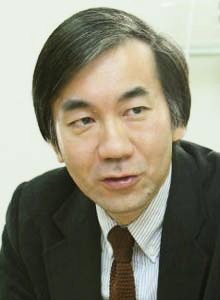 |
Takahashi Tetsuya, Professor of Philosophy at Tokyo University
I wrote a book about my views on political and ideological problems surrounding Japan’s Yasukuni Shrine in April last year. The title of its Korean version is Unavoidable Yasukuni. Readers held various reactions about the expression "emotional alchemy," as used in the book.
The Yasukuni Shrine honors Japanese war dead, and emperors have traditionally paid tribute to the shrine in admiration of the service for the nation by those enshrined there. In Japan, to die on the battlefield is considered an honor for the sake of the nation and the emperor, and those who are enshrined at Yasukuni are known as "model citizens" of the empire. Therefore, the bereaved families of the war dead take pride in the death of their beloved ones instead of being in deep sorrow. They affirmatively accept both the death of their family members and the war. Yasukuni plays a role in completely changing the survivors’ sorrow into happiness; I described this function of the shrine as ’emotional alchemy.’
Such an idea invited many objections. Those who were against my views said, "The feelings of the surviving families are not so simple," or "I don’t think that sorrow can change into happiness so easily." Even I did not believe that the bereaved families’ sadness can disappear so completely. However, according to historical records, families of the dead who were enshrined at Yasukuni "shed tears of inspiration" regardless of their innermost feelings, an outpouring of emotion which was natural, as they were subjects of the empire.
An example in point is an article titled, "After Visiting a Mother of the Military Kingdom," carried in a January 1944 issue of Friends of Housewives
At the age of 20, Matsu married a poor farmer and helped her husband raise silkworms and cattle. While working continuously, she gave birth to her four children. Suddenly, her husband died of pneumonia.
When she first received a notice informing her that her eldest son had died on the battlefield, she collapsed in a mulberry field and watched the sky, silently, until the sun set. This first notice was followed by another: her second son’s death. A third would come later.
Matsu tells of her experience when she paid tribute at Yasukuni while taking part in a ritual to enshrine her sons: "It was an honor to see the emperor pay tribute to the shrine. When residents of a remote mountain village like myself die, even animals living in the mountains don’t shed tears. But my sons sacrificed their lives serving the nation, so the emperor pays homage to them. I was happy and grateful. Happiness replaced sorrow, as I was able to think my sons are living eternally." Such a situation certainly could be described as ’emotional alchemy.’ As if struck by electricity, her feelings were reversed completely.
Here I asked myself, How did this emotional alchemy affect the bereaved Korean families whose family members were forced to fight for Japan and are thus memorialized by the shrine? How did these survivors feel about Yasukuni?
At present, the surviving families have filed a suit in connection with Yasukuni. They understand the reality of the time.
At the time of the war, the Japanese and Korean peoples, as rulers and ruled, respectively, could not be reconciled with each other. The question is whether they could eventually overcome such a schism through common sorrow as bereaved families, regardless of the effects of ’emotional alchemy.’ Or, could they overcome it through their common poverty and pain, which have no connection with the power of rulers? If these divides were impossible to bridge, we need to ask why.





